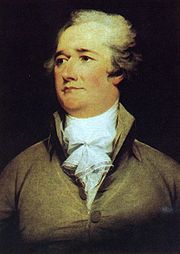
Federalist No. 15
Encyclopedia

Alexander Hamilton
Alexander Hamilton was a Founding Father, soldier, economist, political philosopher, one of America's first constitutional lawyers and the first United States Secretary of the Treasury...
, the fifteenth of the Federalist Papers
Federalist Papers
The Federalist Papers are a series of 85 articles or essays promoting the ratification of the United States Constitution. Seventy-seven of the essays were published serially in The Independent Journal and The New York Packet between October 1787 and August 1788...
. It was published on December 1, 1787 under the pseudonym
Pseudonym
A pseudonym is a name that a person assumes for a particular purpose and that differs from his or her original orthonym...
Publius, the name under which all the Federalist Papers were published. No. 15 addresses the failures of the Articles of Confederation
Articles of Confederation
The Articles of Confederation, formally the Articles of Confederation and Perpetual Union, was an agreement among the 13 founding states that legally established the United States of America as a confederation of sovereign states and served as its first constitution...
to satisfactorily govern the United States; it is the first of six essays on this topic. It is titled, "The Insufficiency of the Present Confederation to Preserve the Union."
Federalist No. 15 warns citizens that the states are on the brink of national humiliation. There is impending anarchy between the states and borrowing and lending policies are causing turmoil. Publius says that the states must make a firm stand for their tranquility, dignity and reputation by creating a new government with a more energetic executive. Publius points out that under the Articles of Confederation, the national government does not have the power or authority to issue sanctions over individuals. The national government cannot enforce its laws because the states cannot be thrown in jail and without an army, the national government cannot enforce taxes on states
"government implies the power of making laws. It is essential to the idea of a law that it be attended with a sanction; or, in other words, a penalty or punishment for disobedience"
Publius argues that government must have force behind its laws. He reminds the reader that punishment for disobedience is necessary because the "passions of men will not conform to the dictates of reason and justice without this constraint." Punishment of individuals, not states, is necessary because "regard for reputation has a less active influence when the infamy of a bad action is to be divided among a number than when it is to fall singly upon one."

